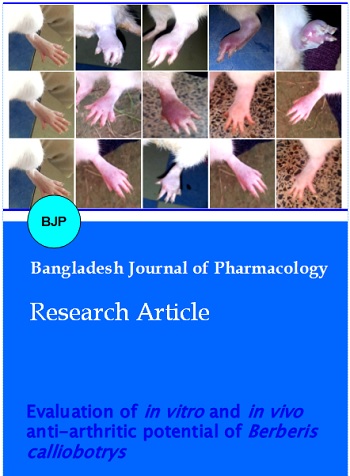Evaluation of in vitro and in vivo anti-arthritic potential of Berberis calliobotrys
DOI:
https://doi.org/10.3329/bjp.v10i4.23779Keywords:
Anti-arthritic, Berberis calliobotrys, Rheumatoid factorAbstract
The present study was commenced to evaluate the anti-arthritic effect of 70% methanol extract and n-butanol and aqueous fractions of Berberis calliobotrys using both in vitro and in vivo arthritis models. Extract and fractions were investigated in vitro for inhibition of protein (bovine serum and egg albumin) denaturation and human red blood cell membrane stabilization. In vivo anti-arthritic activity of extract and fractions at 50, 100 and 200 mg/kg was assessed using turpentine oil and formaldehyde-induced arthritis, while, 200 mg/kg dose was evaluated against complete Freunds adjuvant-induced arthritis. B. calliobotrys produced significant (p<0.001) dose dependent inhibition of protein denaturation and human red blood cell membrane stabilization. In turpentine oil, formaldehyde and complete Freunds adjuvant-induced arthritis models, B. calliobotrys significantly (p<0.001) reduced joint and paw swelling. B. calliobotrys markedly improved body weight, hematology profile, radiological and histopathological parameters in complete Freunds adjuvant model. It could be concluded that B. calliobotrys holds anti-arthritic potential, supporting its traditional use in treatment of rheumatoid arthritis.
Downloads
726
468 Read
359

Published
How to Cite
Issue
Section
License
Authors who publish with this journal agree to the following terms:
- Authors retain copyright and grant the journal right of first publication with the work simultaneously licensed under a Creative Commons Attribution License that allows others to share the work with an acknowledgement of the work's authorship and initial publication in this journal.
- Authors are able to enter into separate, additional contractual arrangements for the non-exclusive distribution of the journal's published version of the work (e.g., post it to an institutional repository or publish it in a book), with an acknowledgement of its initial publication in this journal.
- Authors are permitted and encouraged to post their work online (e.g., in institutional repositories or on their website) prior to and during the submission process, as it can lead to productive exchanges, as well as earlier and greater citation of published work (See The Effect of Open Access).
